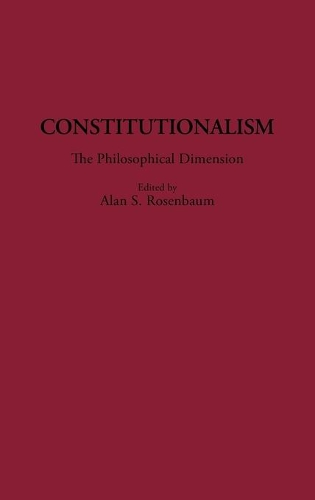
Constitutionalism: The Philosophical Dimension
(Hardback)
Publishing Details
Constitutionalism: The Philosophical Dimension
By (Author) Allen Rosenbaum
Bloomsbury Publishing PLC
Praeger Publishers Inc
2nd September 1988
United States
Classifications
Tertiary Education
Non Fiction
347.302201
Physical Properties
Hardback
288
Description
An excellent sampling of current thinking in the theory and practice of constitutionalism. Each essay was written specifically for this volume by well-known legal and political philosophers. . . . All in all, a first-rate and provocative example of contemporary philosophical concerns. Choice In our constitutional democracy, the dissent and conflict that are the inevitable consequence of free political dialogue point to the importance of reexamining the philosophical premises on which our conceptions of society and government are based. This volume of original essays reviews the foundations of constitutionalism in classical liberal thought and looks at contemporary philosophical perspectives on a wide range of constitutional issues. Written by a distinguished group of philosophers and constitutional scholars, it provides a deeper understanding of the U.S. Constitution as a political instrument and examines the idea of constitutionalism as it functions in our modern world.
Reviews
An excellent sampling of current thinking in the theory and practice of constitutionalism. Each essay was written specifically for this volume by well-known legal and political philosophers. The first section presents consistently high-quality papers on the historical roots of constitutionalism. Leslie Armour sees Locke's "equality of opportunity" as central to American constitutionalism, while Wade Robison stresses the influence of Hume. The French tradition is represented by Guy Lafrance's review of Montesquieu and Rousseau. The often-ignored German tradition is explored by Peter Stillman's paper on Hegel and Marx and Mary Gregor's on Kant. Andrew Reck analyzes the philosophical component of the debates leading to the Great Compromise of 1787. The second section deals with current controversies and is equally solid. Jeffrey Reiman defends constitutional legitimacy on moral and contractual grounds against the Critical Legal Studies Movement (CLSM). Mark Tushnet argues for the CLSM noting that the rule of law must be a rule of men which leads to contradictions in liberal legal thought. Milton Fisk writes on the role of property; Peter French writes on military justice; Richard Falk deals with law and foreign affairs; and Rosemary Tong argues for "loose constructionalism" to deal with modern technology. Jeffrie Murphy concludes with sober reflections on the place of religion in the liberal tradition of rights. All in all, a first-rate and provocative example of contemporary philosophical concerns. For graduate collections.-Choice
The book, as the editor describes it, is intended to be an enduring, scholarly commemoration of the bicentennial of the Constitution of the United States' (p. xi). It contains an extensive bibliography, of both classical and contemporary writers, on its subject as well as a full index.-Ethics
"The book, as the editor describes it, is intended to be an enduring, scholarly commemoration of the bicentennial of the Constitution of the United States' (p. xi). It contains an extensive bibliography, of both classical and contemporary writers, on its subject as well as a full index."-Ethics
"An excellent sampling of current thinking in the theory and practice of constitutionalism. Each essay was written specifically for this volume by well-known legal and political philosophers. The first section presents consistently high-quality papers on the historical roots of constitutionalism. Leslie Armour sees Locke's "equality of opportunity" as central to American constitutionalism, while Wade Robison stresses the influence of Hume. The French tradition is represented by Guy Lafrance's review of Montesquieu and Rousseau. The often-ignored German tradition is explored by Peter Stillman's paper on Hegel and Marx and Mary Gregor's on Kant. Andrew Reck analyzes the philosophical component of the debates leading to the Great Compromise of 1787. The second section deals with current controversies and is equally solid. Jeffrey Reiman defends constitutional legitimacy on moral and contractual grounds against the Critical Legal Studies Movement (CLSM). Mark Tushnet argues for the CLSM noting that the rule of law must be a rule of men which leads to contradictions in liberal legal thought. Milton Fisk writes on the role of property; Peter French writes on military justice; Richard Falk deals with law and foreign affairs; and Rosemary Tong argues for "loose constructionalism" to deal with modern technology. Jeffrie Murphy concludes with sober reflections on the place of religion in the liberal tradition of rights. All in all, a first-rate and provocative example of contemporary philosophical concerns. For graduate collections."-Choice
Author Bio
ALAN S. ROSENBAUM is Associate Professor of Philosophy at Cleveland State University.
